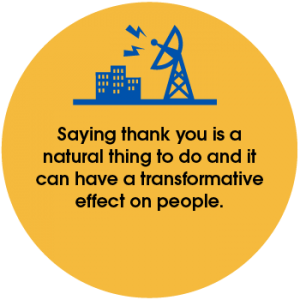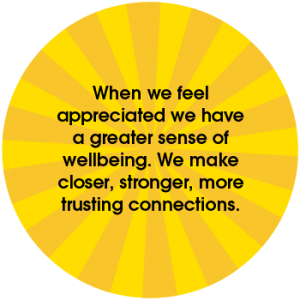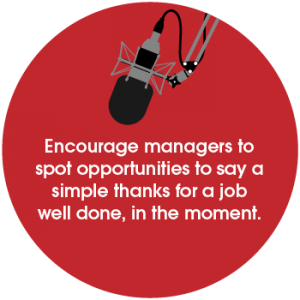Have you received a proper pat on the back lately? Told thank you for a job well done or been noticed for putting in that extra bit of effort?
And if you have, how did it feel?
Saying thank you is a natural thing to do and it can have such a transformative effect on people. Sadly, it’s not a phrase that we tend to hear much at work.
We can make a big difference to employees if we encourage an environment where the words thank you play a greater part in our everyday conversations…
Radio thank you
BBC Radio 4 takes gratitude pretty seriously. In fact, there’s a whole slot dedicated to it. Their Saturday morning show, hosted by Reverend Richard Coles, features a slot called ‘Thank You’ where listeners phone in to express their gratitude for good deeds done. They range from small everyday gestures to life-changing actions. From the man who was so grateful when a taxi driver waived the fare as he took home his newborn baby to people sharing their gratitude for life-saving organ donations.
Each story has its own charm and the evident effect of that good deed is palpable. But this show is all about the value and the significance of the thank you and the power of those two little words.
It’s the same at work.
When we feel appreciated we have a greater sense of wellbeing. We make closer, stronger, more trusting connections with people. And that can result in increased morale and a greater sense of commitment to our organisations.
Resonating with the comms community
Encourage line managers to:
- take the time to acknowledge someone’s efforts
- make the most of informal opportunities to say well done
- understand the power of a natural, spontaneous thank you
We shared this trio of tips on social media recently, all about saying thank you and how recognition in the workplace shouldn’t just mean grand gestures. It’s not about pay rises, awards or bonuses. It’s about natural, personal, meaningful moments of gratitude. And those gestures mean the most when they come from those who we respect, those who know us and the roles we do – our line managers.
It resonated with our connections and, as usual, we had some excellent input from our comms contacts and beyond…
“Small acknowledgements can connect people and strengthen culture and values too.” Vida Ivan | Communications Advisor
“Gratitude needs to be genuinely from the heart.” Becky Wren | Communications Manager
“It only takes a ‘thank you’ or well done’ to make someone feel valued and keep them motivated.” Dee Vining | Administrator
“An authentic, spontaneous thank you is worth so much.” Sally Northeast | Deputy Director, Communications and Participation
“I will always go and seek out top performers and those that have contributed everything they have in their locker to offer my thanks and shake their hand. And I see the best responses from my commitment to this.” Colin Hayes | Shift Manager
“A worthy reminder that Tiny Noticeable Things (TNTs) have a BIG impact!” Emma Lloyd | Global Facilitator
“It’s the small things that build trust.” Alison Kemp | People Skills Expert
“A little compliment goes a long way towards future efforts.” Claire Price | Project Manager
Communicating a culture of gratitude
As internal communicators, we’re well positioned to support an environment where gratitude forms a part of everyday communication. Nudge theory (the subject of our next infographic) and the BIT’s E.A.S.T. framework can help to bring some focus to how we do it.
Make it EASY – ensure that every project or campaign you work on includes a way to recognise the people involved. How will you thank those who have contributed or taken part? Make gratitude business as usual. 
Make it ATTRACTIVE – remind managers about the difference they can make and the benefits that a simple thank you can bring. Often, they underestimate the value they can add.
Make it SIMPLE – people, particularly managers can feel uncomfortable when it comes to communicating with employees. Sometimes this can be the reason why a thank you goes unsaid. Support others, coach them and help them develop their own style so that they can become more confident when communicating gratitude in their own way.
Make it TIMELY – it’s important to encourage an environment where gratitude is considered and planned into our communications. But an on-the-spot thank you can be just as powerful. Encourage managers to spot opportunities to say a simple thanks for a job well done, in the moment.
So, in the words of Reverend Richard Coles, Don’t leave me this way… Bring an attitude of gratitude to your organisation.
Make the words thank you part of everybody’s playlist.
Does your organisation promote a culture of gratitude? How do your people say genuine thank yous? Share your experiences on Twitter @alivewithideas.
by Caroline Roodhouse
















